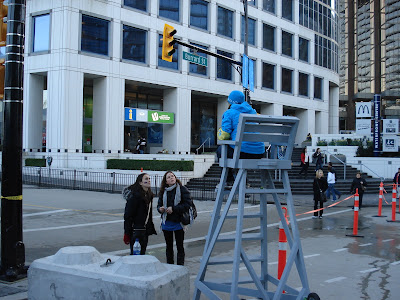Having said that, I should be honest and confess that part of me, nevertheless, is having a wonderful time.
If you are a people-watcher, that is, someone who loves parking himself on a park bench in order to enjoy the parade of personalities that strolls by, you will find the Olympics as a city-wide art gallery, an endless exposition on the art of being human.
There are so many fascinating vignettes playing themselves out everywhere you look, so many riveting scenes to study, and absorb, so many fun tableaus that reveal all the little quirks and bemusements that are such a part of the contradiction of folly and glory involved in living a human life.

It's the small things that stick out in my mind. I will definitely remember the sight of lifeguards at city streetcorners, barking advice into loudspeakers for the sake of tourists drowning in confusion.
 The mecca for people-watchers these days must be the barrier surrounding the Olympic Flame; whether they know what awaits them or not, everyone arrives with a hopeful look, which melts away once in view of the controversial barrier. How do they handle their disappointment? Some put on a brave face and make the best of it, clowning around with theatrical poses making it look like they are themselves holding the flame high atop the scenic Burrard Inlet. Others complain to anyone within earshot, and one guy left without taking a single photo, he was so disillusioned.
The mecca for people-watchers these days must be the barrier surrounding the Olympic Flame; whether they know what awaits them or not, everyone arrives with a hopeful look, which melts away once in view of the controversial barrier. How do they handle their disappointment? Some put on a brave face and make the best of it, clowning around with theatrical poses making it look like they are themselves holding the flame high atop the scenic Burrard Inlet. Others complain to anyone within earshot, and one guy left without taking a single photo, he was so disillusioned.
Maybe that fence will bring one good change to the world: a clearer appreciation of the perils of total top-down planning.
 I have no love for the Olympic Games, but I admit that a small part of me will be sad when the last tourist leaves after the last ceremony, and we go back to the less-crowded, emptier streets of old, giving us our Seawall back... as gorgeous as the view of the mountains may be, it pales in fascination to the feelings invoked by the view of a bubbling sea of humanity.
I have no love for the Olympic Games, but I admit that a small part of me will be sad when the last tourist leaves after the last ceremony, and we go back to the less-crowded, emptier streets of old, giving us our Seawall back... as gorgeous as the view of the mountains may be, it pales in fascination to the feelings invoked by the view of a bubbling sea of humanity.

1 comment:
The mere desire for medals and the mountain of dollars poured into it gets tiresome fast; but the honest quest for physical skill and greatness is a thing to behold. Seems to me criticism of the Olympics should focus on how we are relating the two. Not so well it seems to me from watching the crowds in the street.
The Olympics is about more than sport; it is as you note a festival of representations in quest of some residual memory. I haven't waited in line yet to enter any of the pavillions but from what I have seen the public art component of this affair is a disaster, a sign of the collapse of figurative disciplines and their worship of the silliest "conceptual" art. I wonder if you might reflect on how these scenes you are taking in could be well-represented for cultural memory. I have to say that last photograph of yours only brings to mind the notion that those among us looking for places to hang our control-freak "leaders" must be salivating at the new possibilites! THe problem with the Olympics is that it leads too easily to a desire for crudely sacrificial esthetics.
Post a Comment